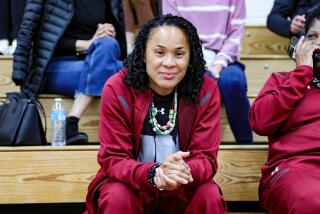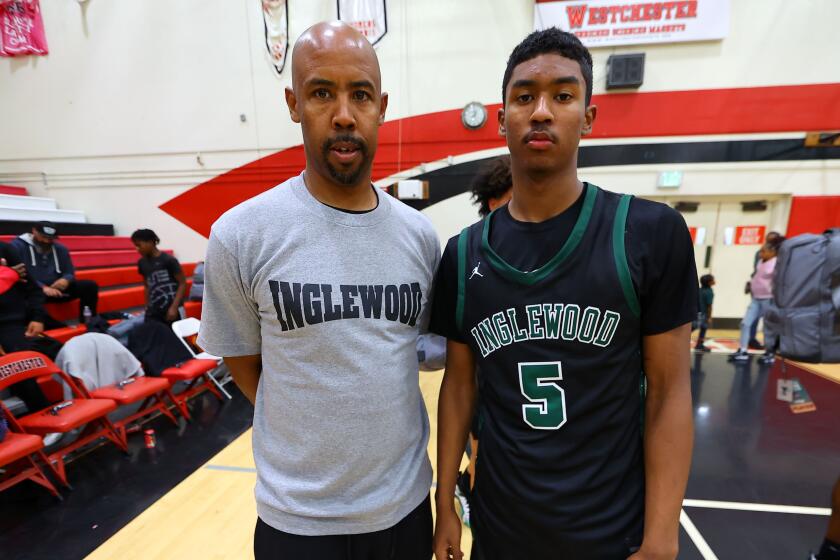Odyssey Leads to More Than Fame : College football: Life takes Brigham Young’s Elewonibi from Nigeria to Canada to Utah--and to peace of mind.
PROVO, Utah — The story is about a football player and his journey from a country torn by civil war to one in which he has been selected as the outstanding interior lineman in college football.
His skill at a game he did not see until he was nearly a teen-ager would be enough for most stories. But the education of Mohammed Elewonibi is not only about football; it is about life.
And it can answer larger questions than how Elewonibi and No. 19 Brigham Young (10-2) will fare in their Holiday Bowl game Friday against No. 18 Penn State (7-3-1) at San Diego Jack Murphy Stadium.
Elewonibi’s experiences are as heartening as his discovery of a comfortable way of life in the relative quiet of Utah, or as heart-breaking as the divorce of his parents when he was 11 and his resulting flight to live with relatives in Canada. They are as adventurous as his two years before college, spent traveling and working odd jobs, or as disturbing as his introduction to racial prejudice.
Elewonibi said he was 15 when, for the first time, someone directed a racial slur at him. That experience leaves a more permanent mark than any hit on the football field.
“I didn’t know too much about prejudice then,” Elewonibi said. “I wasn’t expecting it. I got introduced to the dark nature of man. That kind of changed my attitude toward people a little bit.
“I came in very naive. Some things happened like that that changed how I think and how I act. I closed up. I don’t think I am as open with people as I was.”
That would be hard to believe. Elewonibi is a willing subject. No question is answered thoughtlessly. His replies are mixed with wit and insight. His enthusiasm for football and his amazement at his quick success sound genuine, for he, too, understands the uniqueness of his story.
JOURNEY TO UTAH
Not every day does a soccer-, rugby- and basketball-playing son born to a Canadian mother and a Nigerian father, go on to become a college football player, yet alone be voted the best at his position. Add in a civil war, a move to Canada and time spent as a lumberjack, seafood cook, tractor-trailer driver and bouncer, and the elements are there for quite a tale.
Then consider that Elewonibi took up football seriously only after deciding to follow some friends to Snow College in Ephraim, Utah, in 1986, and that after transferring to BYU two years later, he was plagued by shoulder problems that limited him to starting one game before this season.
Any part of the story by itself would be special, but taken together, it sounds too rich for one person to have experienced. As Elewonibi shows through recounting the journey, he discovered much along the way.
Elewonibi’s father, Momodu, was a commander in the Nigerian navy and was stationed in Victoria, British Columbia, in 1964 for advanced training. A worker on the base introduced Momodu to her niece, Margo. They married and moved back to the Nigerian capital of Lagos in 1965.
Mohammed was born on Dec. 16, 1965, and his brother, Michael, a sophomore wide receiver at Snow, was born three years later. Momodu started a distribution business. It was a time of civil war in Nigeria, which gained its independence from Great Britain in 1960.
For someone as young as Mohammad Elewonibi and his brother, the war and troubles in the eastern region, known as Biafra, were distant but not unfamiliar.
“I remember the gunfire, the rationing of goods, the restricted movement,” Elewonibi said.
Elewonibi said his father’s business began to prosper, but his parents’ marriage started to crumble. Then one day in September of 1977, his mother hastily put him and his brother on a plane in Lagos bound for the Ivory Coast.
The trip eventually took them to New York and then on to Victoria, where they were met by his uncle. Elewonibi and his brother lived with his aunt and uncle for several months before being joined by his mother.
PAIN OF SEPARATION
Elewonibi has not returned to Nigeria, and he has seen his father only three times in 12 years. He said he wonders if his success at football has filtered back to Nigeria or to his father, who now lives in London.
“The first few years in Canada were kind of turbulent,” Elewonibi said. “Money was a problem between my mom and dad. Maybe because of that I never really had the desire to go back (to Nigeria).”
Dealing with the pain of his parents’ breakup was difficult, Elewonibi said, but he found curious distractions in his new world. He said his mother told him he did not have to start school again until after Christmas; there could be no better present for a wide-eyed 11-year-old. He became fascinated by television.
“In Nigeria there was TV, but nothing for children,” Elewonibi said. “When I got to Canada, it was like an explosion. I watched TV all day long. I watched all the shows--the Andy Griffith Show, the Brady Bunch. I remember watching until four in the morning, until my aunt would come down and say to go to bed.”
Other changes were more profound.
“The biggest thing was the color change,” Elewonibi said. “I went from seeing 95% black people to seeing one other black person for a year, which was my brother. It threw me. It was really weird.”
Elewonibi said he drifted through high school. He played some sports, but not football. His grades were nothing special and at graduation, Elewonibi said, rather than college, he opted to travel.
“I wanted to get away from a few things,” Elewonibi said. “I had been living my life for others for so long, I just wanted to do those things on my own.”
He went with friends to Europe, where he met his father, and then to South America. He returned to Canada and began a series of odd jobs before settling into a job as a bouncer. He lived in a trailer home, which he shared with friends.
But he said he wanted more. He began to think about college. And when the brother of one of his housemates wrote that he was having a great time playing football at Snow, Elewonibi said he decided to give it a try.
Elewonibi said his football experience had been limited to one season with a club team. “I wasn’t really impressed with it,” he said. But he said his size (6-foot-5, 290 pounds) and athletic ability gave him reason to believe he could play football. He decided to give Snow a chance.
CHANGE IN LIFE STYLE
His lack of knowledge of football was exceeded only by his ignorance of Snow and its location in Ephraim, a town of 2,500 about 80 miles south of Provo. Neither did Elewonibi, a Moslem who said his religious background is modest, know much about the Mormon faith that dominates the area and its teachings of a strict life style.
“Before I came here, if you asked me who a Mormon was, I would have described the Amish people,” Elewonibi said.
On his first day in Utah, Elewonibi came out of a store with a 12-pack of beer and began to drink it on his way back to his apartment. He was stopped by local police and was told consuming beer in public was illegal. Elewonibi’s reaction was disbelief.
“It just blew me away,” he said. “No one mentioned the restrictiveness of the area before I got there.”
Alcohol was far from a foreign substance. He did not understand the restrictions. He said he thought about leaving.
Not until Snow Coach Paul Tidwell, then an assistant, said he saw him loading a couple of six-packs of beer into a shopping cart one day was the point brought home.
“He said in Canada, they always had a beer after their meal,” Tidwell said. “I told him things were different here. He couldn’t just go into the store and load up with beer without someone taking notice.”
While Elewonibi adjusted to Ephraim, he began to find quick success on the field as an offensive guard. He picked up the game quickly and by his sophomore season was being recruited by several major schools. He visited Arizona, Purdue and Texas A&M; but decided to stay in Utah. He enrolled at Brigham Young University in time for 1988 spring practice.
BYU might appear a curious choice. The school is affiliated with the Mormon church, and students are expected to abide by the rules of no drinking and no smoking. Elewonibi said he once did both.
But two years at Snow changed him, Elewonibi said. He looked for a simpler way.
“I felt more comfortable, more safe here,” Elewonibi said. “They stress things I like, such as family. You come here and you can avoid a lot of things in life. It is kind of like a safe, closed community.
“Working in clubs, I drank. I came here and I had to cut it off and a lot of other things that might have taken over my life. I wasn’t really looking for that, but it was part of the deal.
“It was good for me because I was letting alcohol and all the other things get a little out of hand in my life.”
INJURIES TAKE TOLL
Football success came slower. His left shoulder had become a problem. He first injured it late in his sophomore season at Snow and underwent surgery. He reinjured it again in spring practice and underwent three more operations before the 1988 season. That kept him out of the first four games and also contributed to his putting on extra weight, to 315 pounds.
“I was so disappointed because I set better goals for myself,” Elewonibi said. “I remember going into Coach (LaVell) Edwards’ office, trying to bring up the topic of red-shirting.”
But the coaches decided against that, and Elewonibi was well enough to play the second half of the season, starting one game. But the shoulder acted up again and that required more surgery. He missed spring practice but was considered a favorite to step into the starting lineup come fall.
He did that and more. He became the anchor of a line that allowed quarterback Ty Detmer to pass for 4,560 yards, an NCAA record for a sophomore. He won the Outland Trophy.
He was the second BYU player to win the award in four seasons--defensive tackle Jason Buck, now of the Cincinnati Bengals, won in 1986--and the third Western Athletic Conference player in four years. Air Force defensive tackle Chad Hennings won in 1987.
Elewonibi was selected over finalists Morris Gardner, a junior nose tackle from Illinois, and senior center Michael Tanks of Florida State by an eight-member panel of the Football Writers Assn. of America. Elewonibi received four votes, Gardner three and Tanks one, according to a source. The same source said that in a season without a clear favorite, Elewonibi’s unusual background was a factor in the selection.
However the selection was made, Elewonibi’s life has changed. Media attention has increased. Professional football offers a lucrative future.
“He is so far ahead of the other guys mentally, he belongs in the professional ranks,” said Roger French, BYU offensive line coach. “He is a very astute ‘understander’ of football. It was like football was innate to him.”
Of course, growing up in Nigeria, football was far from natural. But somehow Elewonibi has made it his game and along with it, learned more about life.
More to Read
Go beyond the scoreboard
Get the latest on L.A.'s teams in the daily Sports Report newsletter.
You may occasionally receive promotional content from the Los Angeles Times.










